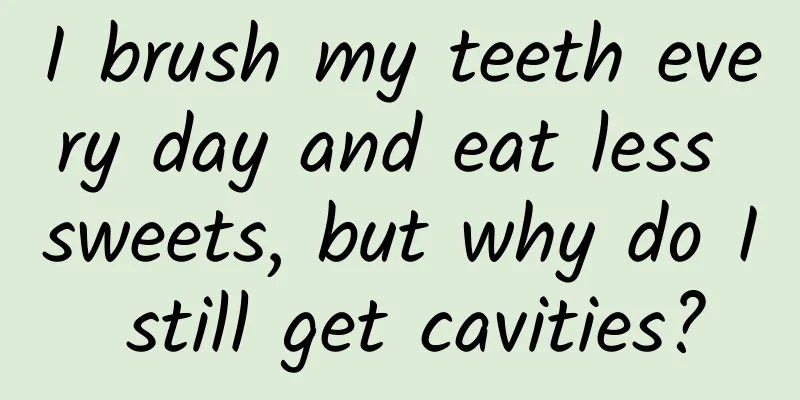I brush my teeth every day and eat less sweets, but why do I still get cavities?

|
The four factors that cause dental caries include bacteria, oral environment, host and time. The interaction of these four factors leads to the occurrence of dental caries. To prevent dental caries, we must naturally avoid the opportunity for the four factors to interact with each other. 【Clinic footage playback】 A 5-year-old girl came to see a doctor because of toothache. After examination, it was found that the child had 3 decayed teeth, one of which had an obvious cavity in the molar, which had damaged the dental nerve and required root canal treatment. The parents were confused and raised 3 questions: 1. We have always paid attention to our child’s diet and rarely give her sweets. How come she still got tooth decay? 2. My child brushes his teeth carefully every morning and evening, so why do his teeth still get bad? 3. Baby teeth will be replaced sooner or later. Is it possible to not get treatment and just wait until the baby teeth are replaced? This parent's confusion is very common. Now let us answer the parent's questions one by one. Why do you get tooth decay even if you don’t eat sugar? Dental caries, commonly known as tooth decay, is a bacterial disease. The four factors that are currently recognized as the cause of dental caries include bacteria, oral environment, host and time. The interaction of these four factors will lead to the occurrence of dental caries. There are many cariogenic bacteria in the mouth, such as Streptococcus and Lactobacillus. These bacteria form acidic substances in the process of breaking down food residues, especially sugars. A large number of bacteria gather together to form dental plaque. Dental plaque adheres to the surface of teeth for a long time and will erode the teeth little by little, causing demineralization of the enamel and eventually forming caries. Therefore, even if children do not eat any candy, they still cannot avoid tooth decay if they do not clean their mouths properly. Moreover, the sugar in food residues does not only refer to sweets such as candy and chocolate, but also daily foods such as bread and rice, which also contain sugar. This also explains the first question raised by the parents in the case. Tooth decay is the result of the interaction of multiple factors. Controlling the intake of sweets can reduce the occurrence of tooth decay to a certain extent, but it does not mean that you will not get tooth decay if you do not eat sugar. In addition, chewing thoroughly helps prevent tooth decay. On the one hand, chewing can stimulate saliva secretion. On the other hand, relatively rough foods containing fiber can rub and clean the tooth surface during chewing, which helps the oral cavity to clean itself. The child in the case was used to eating relatively soft and rotten food, which to a certain extent also contributed to the occurrence of tooth decay. Why do I still get cavities even though I brush my teeth every day? Brushing teeth is a technical job, and there are many areas that are easily overlooked. For example, the occlusal surface is full of grooves and complex terrain, and food residues are easily gathered. You need to use a little force and brush back and forth to clean it. For example, between teeth, brushing can remove plaque on the surface of teeth, but it is helpless for food residues hiding in the gaps between teeth, and fine dental floss is needed to help. The outer side of the back teeth and the inner side of the teeth are also not easy to clean. It can be seen that "knowing how to brush teeth" and "brushing teeth cleanly" are really two different things. Even if younger children have learned the process of brushing teeth, it is difficult for them to brush their teeth clean without leaving any dead corners. If children want to truly brush their teeth independently, the fine movements and small muscle groups of their hands need to develop to a certain level. Therefore, it is recommended that parents help their children brush their teeth until they are at least 6 years old. Parents can do this: let the child brush his teeth first, and then the parents brush them again, brushing the inside, outside, and occlusal surfaces of the teeth, brushing them thoroughly without missing any teeth. In addition, you should also develop the habit of using dental floss to clean the gaps between teeth, so as to prevent tooth decay comprehensively. At this point, the second question of the parents in the case has an answer. Although the child brushes his teeth every day, if the strength, frequency and duration are not enough, his teeth are not really clean. Baby teeth will be replaced sooner or later, so why do we need to treat tooth decay? Now that we understand the causes of tooth decay, let’s move on to the third question: Since decayed deciduous teeth will be replaced sooner or later anyway, is it okay to wait for them to fall out naturally without treatment? The answer is: No. This is because both the deciduous tooth germs and the permanent tooth germs are formed during the fetal period. Although the deciduous teeth emerge first, the permanent tooth germs continue to develop in the jawbone at the same time. If decayed deciduous teeth are not treated in time, they may gradually develop into pulpitis and apical periodontitis, which in turn may affect the tooth germs of permanent teeth and cause problems such as poor development and uneven arrangement of permanent teeth. If there are multiple decayed deciduous teeth, it may affect the child's pronunciation and chewing function, and even affect the development of the maxillofacial area. Therefore, once you find that your child has tooth decay, you must treat it promptly and actively. The earlier the treatment, the less expensive and painful it is. How to prevent tooth decay? Now that we understand the causes of tooth decay, let’s talk about how to prevent it. Rinse your mouth frequently and brush your teeth carefully After your child has finished eating, let him drink a mouthful or two of clean water to rinse his mouth and remove food residues in time. When brushing teeth, be sure to brush thoroughly and cleanly. The combination of toothbrush and toothpaste can effectively remove food residues and acidic substances attached to the surface of teeth and maintain oral hygiene. Fluoride coating, pit and fissure sealing Fluoride coating is to apply fluoride to the surface of teeth to protect them from external erosion. Children over 3 years old should usually be coated with fluoride once every 3 months. Pit and fissure sealants use special materials to fill the uneven pits and gaps on the occlusal surface of molars to prevent tooth erosion and reduce the risk of caries. Usually, pit and fissure sealants are performed on deciduous molars at the age of 3 to 4, pit and fissure sealants are performed on the first permanent molars at the age of 6 to 8, and pit and fissure sealants are performed on the second permanent molars at the age of 11 to 13. Regular inspection It is recommended to take your child for an oral examination every 3 to 6 months so that any problems can be detected and intervened early. The doctor will give relevant suggestions based on the results of the oral examination, such as whether fluoride application or pit and fissure sealing is needed, whether treatment is needed, etc. If conditions permit, it is best to take the whole family for a caries risk assessment regularly. Because caries are caused by bacteria, if a family member has a high risk of caries in the oral environment, then during meals or close contact with the child, it is likely to be "infected" to the child. Caries risk assessment can detect the number and distribution of bacteria in the mouth, so that more targeted prevention can be carried out to reduce the risk of caries. Clinic 4D Prescription In view of the child's situation in the case, the medical team gave the following suggestions: ● Medical prescriptions are based on the degree of tooth decay. The dental nerves of the two teeth are not damaged, so the damaged area needs to be cleaned, the teeth need to be disinfected, and then filled with artificial materials; the tooth cavity of the other molar is too large and requires root canal treatment. ●Psychological prescription Children usually have a fear of filling teeth. Parents can explain to their children the impact of dental caries on health and the necessity of cooperating with treatment. Children may need to undergo treatment several times. It is best for parents to bring their children to the doctor a little in advance so that they can get familiar with the environment and be mentally prepared. ●Exercise prescription: Adhere to physical exercise and ensure appropriate time for outdoor activities every day. ●Nutritional prescription: Eat a balanced diet, increase the intake of fiber foods appropriately, and encourage children to chew thoroughly. This is beneficial for self-cleaning of teeth and promotes the growth and development of the oral and maxillofacial area. Summary of this clinic: ●Dental caries is the result of the interaction of multiple factors. Controlling the intake of sweets can reduce the occurrence of dental caries to a certain extent, but it does not mean that you will not get dental caries if you do not eat sugar. ● Knowing how to brush teeth does not mean brushing them clean. It is recommended that parents help their children brush their teeth until they are at least 6 years old. ●If decayed deciduous teeth are not treated in time, it may affect the development of permanent teeth, so once you find your child has dental caries, you must treat it promptly and actively. The earlier the treatment, the less expensive and painful it is. |
<<: Pingdom: 24% of the top 10,000 websites in the world use Facebook's official plug-in
>>: How to expose Twitter scams – Infographic
Recommend
What to do if you have dry eyes after miscarriage?
Sexual life is something that many lovers and cou...
What to do if a pregnant woman catches a cold in the late stage
Pregnant women have a relatively weak constitutio...
The benefits of milk powder for women
Milk powder is not just for babies. In fact, midd...
How to communicate with friends who are suffering from depression
Depression is the most common mental illness toda...
How to prevent buttock pain during confinement
Pregnancy is something that requires extra cautio...
What is considered a regular menstrual period?
Under normal circumstances, menstruation comes on...
Help, why do you keep gaining weight? Because fat cells "remember" that you were fat...
I wonder if you have ever joined the army of weig...
Treatment of cholestasis of pregnancy
I believe that many female friends during pregnan...
Six months pregnant waist pain
In the sixth month of pregnancy, low back pain is...
If a bug gets into your eye, do you catch it or let it run away on its own?
I believe everyone will have this situation. It&#...
Can I eat mung beans after giving birth?
Mung beans are very good for our health. Women ar...
What is the yogurt-like vaginal discharge?
Discharge is a condition that all women have, and...
How long does it take to get your period after a miscarriage?
After an abortion, the uterus has been traumatize...
How to stick the nail plate firmly
Nowadays, manicure has been pursued and loved by ...









